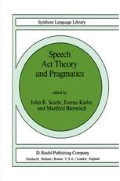Abstract
In this paper I am going to discuss some types of yes-no questions which — under normal circumstances — cannot be answered equally well by a plain ‘yes’ or a plain ‘no’. My account of these questions will principally be based on the theory of indirect speech acts and the theory of conversation.
The work reported here was carried out within the framework of the cooperation between the Institute for Information Sciences (KVAL), Stockholm and the Institute of Linguistics, Hungarian Academy of Sciences, Budapest.
Access this chapter
Tax calculation will be finalised at checkout
Purchases are for personal use only
Preview
Unable to display preview. Download preview PDF.
References
Davison, A.: 1975, ‘Indirect Speech Acts and What to Do with Them,’ Syntax and Semantics 3, pp. 143–186.
Grice, H. P.: 1975, ‘Logic and Conversation,’ Syntax and Semantics 3, pp. 43–58.
Kiss, E.: 1977, ‘Topic and Focus in Hungarian Syntax,’ Montreal Working Papers in Linguisticsy Vol. 8, pp. 1–43.
König, P.: 1977, ‘Form und Funktion. Eine funktionale Betrachtung ausgewählter Bereiche des Englischen,’ Niemeyer: Tübingen.
Moravcsik, P.: 1971, ‘Some Cross-linguistic Generalizations about Yes-no Questions and their Answers,’ Working Papers on Language Universals 7, pp. 45–193, Stanford, California.
Pope, P. N.: 1976, ‘Questions and Answers,’ Mouton: The Hague.
Searle, J. R.: 1975, ‘Indirect Speech Acts,’ Syntax and Semantics 3, pp. 59–82.
Searle, J. R.: 1976, ‘A Classification of Illocutionary Acts,’ Language in Society 5, pp. 1–23.
Wikberg, K.: ‘Yes-no Questions and Answers in Shakespeare’s Plays,’ A Study in Text Linguistics, Acta Academiae Aboensis, Ser. A, Vol. 51, No. 1, Åbo Akademi.
Wunderlich, D.: 1976, ‘Studien zur Sprechakttheorie,’ Suhrkamp: Frankfurt am Main.
Editor information
Editors and Affiliations
Rights and permissions
Copyright information
© 1980 D. Reidel Publishing Company
About this chapter
Cite this chapter
Kiefer, F. (1980). Yes-No Questions as Wh-Questions. In: Searle, J.R., Kiefer, F., Bierwisch, M. (eds) Speech Act Theory and Pragmatics. Texts and Studies in Linguistics and Philosophy, vol 10. Springer, Dordrecht. https://doi.org/10.1007/978-94-009-8964-1_5
Download citation
DOI: https://doi.org/10.1007/978-94-009-8964-1_5
Publisher Name: Springer, Dordrecht
Print ISBN: 978-90-277-1045-1
Online ISBN: 978-94-009-8964-1
eBook Packages: Springer Book Archive

